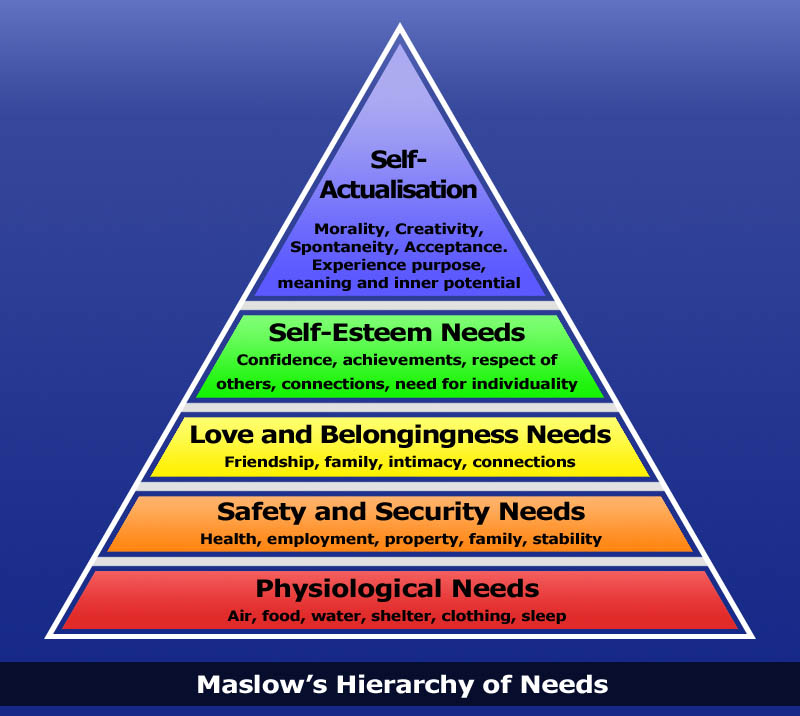LonestarCowgirl
New member
- Joined
- Oct 21, 2013
- Messages
- 482
Bump.
Today, I briefly mentioned Maslow's theory in the ENTP and the inability to maintain a long term relationship thread.
I'm not ashamed to acknowledge, my personal experience aligns with Maslow's theory. I can say for the sake of clarity, I'm trying to find a way of looking at the following 2-quotes from ENTP's in a way that makes sense:
I wonder if perhaps the reason for that may be... Deficiencies within the level of love on Maslow's hierarchy [see chart below] – due to neglect, shunning, ostracism, bullying, etc. – can impact the individual's ability to form and maintain emotionally significant relationships in general. [Source: Maslow's hierarchy of needs - Wikipedia, the free encyclopedia]
[MENTION=22098]Jarlaxle[/MENTION]'s response to them made a lot of sense to me...
Maslow's Hierarchy of Needs

The most fundamental and basic four layers of the pyramid contain what Maslow called "deficiency needs" or "d-needs": esteem, friendship and love, security, and physical needs. If these "deficiency needs" are not met – with the exception of the most fundamental (physiological) need – there may not be a physical indication, but the individual will feel anxious and tense.
Deficiencies within the level of love on Maslow's hierarchy – due to neglect, shunning, ostracism, etc. – can impact the individual's ability to form and maintain emotionally significant relationships in general. According to Maslow, humans need to feel a sense of belonging and acceptance among their social groups, regardless whether these groups are large or small. For example, some large social groups may include clubs, co-workers, religious groups, professional organizations, sports teams, and gangs. Some examples of small social connections include family members, intimate partners, mentors, colleagues, and confidants. Humans need to love and be loved – both sexually and non-sexually – by others. Many people become susceptible to loneliness, social anxiety, and clinical depression (suicidal) in the absence of this love or belonging element. This need for belonging may overcome the physiological and security needs, depending on the strength of the peer pressure.
Source: Maslow's hierarchy of needs - Wikipedia, the free encyclopedia
Today, I briefly mentioned Maslow's theory in the ENTP and the inability to maintain a long term relationship thread.
I'm not ashamed to acknowledge, my personal experience aligns with Maslow's theory. I can say for the sake of clarity, I'm trying to find a way of looking at the following 2-quotes from ENTP's in a way that makes sense:
I'm not sure whether this is a common entp problem, but I can barely maintain a long term relationship (regardless platonically or romantically). I get bored really easily with people. Like, after a few weeks of constantly having fun interacting with a friend, I would be very much uninterested with them and would somewhat avoid them and interact with others. But then after a few months (sometimes weeks) my interest towards them would return and we would hang out again;
and the cycle goes on and on.
The problem may seem very ordinary but the my interest in people changes very drastically in a rather quick timing.
What frustrate me the most is that I got to the point of realising that there's no one to who would be able to relate with me in real life and argh
An INTP will accept the fact that, actually, you [ENTP] don't care about people (even if you are never better than with people, and you know it perfectly).
I wonder if perhaps the reason for that may be... Deficiencies within the level of love on Maslow's hierarchy [see chart below] – due to neglect, shunning, ostracism, bullying, etc. – can impact the individual's ability to form and maintain emotionally significant relationships in general. [Source: Maslow's hierarchy of needs - Wikipedia, the free encyclopedia]
[MENTION=22098]Jarlaxle[/MENTION]'s response to them made a lot of sense to me...
You will feel alone, and... That's not a bad thing. It will force you to provide your own stimuli and gain some insight into yourself, it will force you to reevaluate what's important to you, and it will seed a new developing line of questioning in your life that people with more developed Fe seem to know long before us, giving you the ability to evaluate what kind of a person you want to be for others. This kind of fall is part of the package and seems to be somewhat of a right of passage many ENTPs go through, and we pick ourselves up on the exit road. You'll do the same.
Maslow's Hierarchy of Needs

The most fundamental and basic four layers of the pyramid contain what Maslow called "deficiency needs" or "d-needs": esteem, friendship and love, security, and physical needs. If these "deficiency needs" are not met – with the exception of the most fundamental (physiological) need – there may not be a physical indication, but the individual will feel anxious and tense.
Deficiencies within the level of love on Maslow's hierarchy – due to neglect, shunning, ostracism, etc. – can impact the individual's ability to form and maintain emotionally significant relationships in general. According to Maslow, humans need to feel a sense of belonging and acceptance among their social groups, regardless whether these groups are large or small. For example, some large social groups may include clubs, co-workers, religious groups, professional organizations, sports teams, and gangs. Some examples of small social connections include family members, intimate partners, mentors, colleagues, and confidants. Humans need to love and be loved – both sexually and non-sexually – by others. Many people become susceptible to loneliness, social anxiety, and clinical depression (suicidal) in the absence of this love or belonging element. This need for belonging may overcome the physiological and security needs, depending on the strength of the peer pressure.
Source: Maslow's hierarchy of needs - Wikipedia, the free encyclopedia
